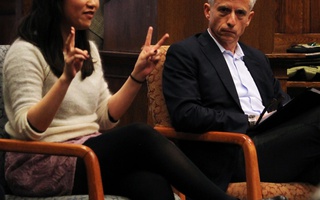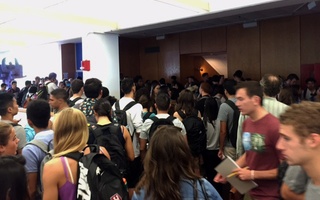As the College readies for a fall rollout of its first honor code, undergraduates on the student-faculty body that will hear cases of academic integrity have begun their training, which included signing a confidentiality agreement.
Once it begins hearing cases, the body, called the Honor Council, hopes to eventually release statistics comparable to those the College’s Administrative Board currently does, according to Interim Ad Board Secretary Brett Flehinger, who will serve as secretary of the Honor Council in the new Office of Academic Integrity and Student Conduct next academic year.
{shortcode-079703f4278d29eb2a1c13aae60c7619429b2a00}
Earlier this month, the College published the names of 26 College students who will comprise the undergraduate affiliates of the Honor Council—12 members who will hear cases and 14 who will serve as “academic integrity fellows” to assist students in the case and discipline process. Both groups have begun attending a two-hour weekly training session each Monday, led by administrators and students including Flehinger, soon-to-be Ad Board secretary Lauren E. Brandt, Resident Dean of Freshmen for Ivy Yard Michael C. Ranen, and Olivia Z. Zhu ’15, a member of the Academic Integrity Committee, which drafted the honor code.
The fully-staffed Honor Council will also include 12 non-undergraduate members, whom Flehinger said administrators have not yet appointed.
A large portion of the training thus far has focused on studying sample cases, although members have been approaching their discussions as if the cases were real, Flehinger said. For that reason, the members have already signed a confidentiality agreement and are expected to keep details of mock cases private, according to Flehinger. In the future, the Office of the General Counsel, according to Flehinger, will specify their legal obligations for confidentiality.
“Everything is confidential from the beginning,” Flehinger said, referring to the case materials.
Undergraduates on the Honor Council praised the training thus far. They said it features collaborative interactions and discussions with students, faculty, and administrators about readings and cases.
“I feel much better that I’m sharing the burden with other people,” Honor Council member Matthew J. Vegari ’17 said.
While some members readily acknowledged that determining sanctions for fellow students might be challenging, they emphasized what they perceived as their prominent role beyond the honor code or Council in shaping a broader attitude towards academic integrity at the College.
“I anticipate that doing this will not always be easy,” said Lien E. Le ’17, a Crimson associate arts editor who will serve on the Honor Council. “I’m doing this not because I think I’m going to enjoy it, but because I think it’s really important.”
Nathaniel R. F. Bernstein ’17, who is a member of the Academic Integrity Committee and the Honor Council, stressed the “leading role” he said students are serving in the rollout of the honor code and ownership of conversations surrounding academic integrity.
“You can't make any kind of argument anymore that there is some kind of outside force and it’s sort of bearing down—it’s all [of] us, and we have to be able to own that,” Bernstein said.
Administrators and students said their work as members of the College’s first true student-faculty disciplinary board will not be limited to only hearing cases, but will also include efforts at broader outreach to the College.
According to Flehinger, the students may meet with classes as well as with student groups and academic departments, with an emphasis on reaching out to the Class of 2019 beginning at this year’s visiting weekend for prospective students, Visitas.
Jonathan G. Jeffrey ’16, a member of the Council as well as the Academic Integrity Committee, said he sees his role as being an “ambassador of the code and the Council in many ways.” Additionally, he said students would serve as pivotal actors in helping to “serve the community” including by hosting events related to issues of integrity.
“A bigger challenge is going to be how we communicate their work and the work of the [student academic integrity fellows] to the community,” Ranen said.
Next month, the Faculty of Arts and Sciences is expected to vote on a proposal for the affirmation of integrity portion of the Honor Code. If approved in its current form, the mandate would require students to sign a statement acknowledging their awareness of the Honor Code prior to final exams, as well as final papers and projects.
—Staff writer Noah J. Delwiche can be reached at noah.delwiche@thecrimson.com. Follow him on Twitter @ndelwiche.
—Staff writer Ivan B. K. Levingston can be reached at Ivan.Levingston@thecrimson.com. Follow him on Twitter @IvanLevingston.
Read more in College News
UC Appoints Director To Encourage 'Prompt' Email ResponsesRecommended Articles
-
A Better Approach to Academic IntegrityThe Honor Council’s inclusion of students represents immense progress, but it must continue working to avoid the pitfalls of its predecessor.
-
 College Hosts Honor Code Panel
College Hosts Honor Code Panel -
 Some, but Not Many, Opening Lectures Talk Honor Code
Some, but Not Many, Opening Lectures Talk Honor Code -
 Quieting Previous Publicity Campaign, Honor Council Selects 11
Quieting Previous Publicity Campaign, Honor Council Selects 11 -
 Sophomores, Sciences Saw Most Honor Council Cases Last Year
Sophomores, Sciences Saw Most Honor Council Cases Last Year













